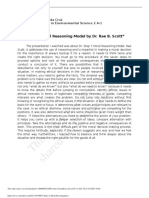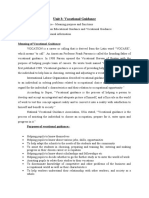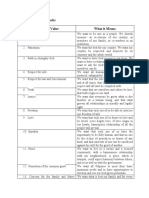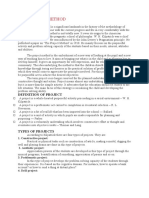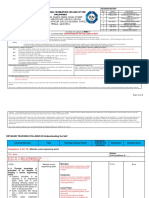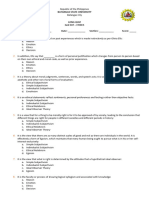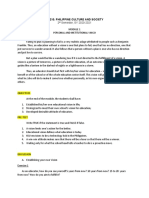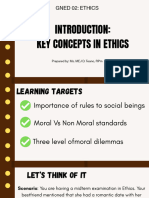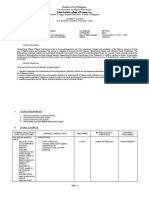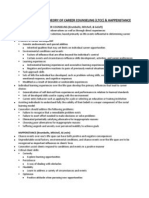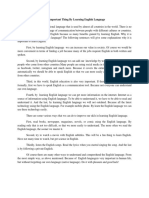A Brief History of Counselling
A Brief History of Counselling
Uploaded by
ESGaringoCopyright:
Available Formats
A Brief History of Counselling
A Brief History of Counselling
Uploaded by
ESGaringoOriginal Description:
Copyright
Available Formats
Share this document
Did you find this document useful?
Is this content inappropriate?
Copyright:
Available Formats
A Brief History of Counselling
A Brief History of Counselling
Uploaded by
ESGaringoCopyright:
Available Formats
A Brief History of Counselling
To understand the history of counselling, we begin with the realisation that
throughout the years, human beings have found comfort in sharing their
problems or telling their story to others. The old saying a problem shared is a
problem halved tells us one universal human truth: that when things get difficult
or we have to make decisions in our life, sometimes we need someone to listen
and hear our story so we can get a better idea of our options.
Counselling history can be traced back to tribal times where people would came
together in a group and share their experiences and sometimes their dreams. As
civilisation developed, religion offered a type of counselling, usually by priests
who would listen and advise parishioners on their problems (they still do).
In the 1890s, German neurologist Sigmund Freud developed a theory later to be
called psychoanalysis, which allowed individuals to tell their problems to a
psychoanalyst, an individual trained in interpreting the subconscious , that part
of our psyche that we are not aware of but influences what we do. Freud played
an important part in the history of counselling, but the actual word counselling
did not come into everyday language until the 1960s.
Counselling really took off after the Second World War, in 1950s America. Most of
the therapies we hear about today can trace their origins back to a handful of
psychologists and psychiatrists (some of whom we will look at in this guide) who
developed techniques and theories, sometimes referred to as schools of
therapy.
The word school in counselling does not mean a building or campus. Rather it
refers to how psychologists believe human beings develop their view of the world
they live in and how they cope with it. The three schools are Psychoanalytical,
Behaviourist, and Humanistic, which we will look at later in this guide.
There have been many developments in counselling since the 1950s. A lot of
research has taken place and this has given us a better understanding of what
makes human beings think and act in certain ways. However most psychologists
and counsellors would agree that we are a long way from fully understanding
what makes each human being unique.
When we consider the history of counselling, it is worth noting that with the
introduction of new techniques and research, the history of counselling is still
being written today.
Source: http://counsellingtutor.com/introduction-to-counselling/history-of-counselling/
You might also like
- The Secret Language of Your Name - Ch. 1Document26 pagesThe Secret Language of Your Name - Ch. 1Beyond Words Publishing92% (36)
- Detailed Lesson Plan (DLP) - CitizenshipDocument3 pagesDetailed Lesson Plan (DLP) - CitizenshipESGaringo89% (19)
- Cultural Anthropology An Applied Perspective 9th EditionDocument17 pagesCultural Anthropology An Applied Perspective 9th EditionESGaringo0% (1)
- Watson's Theory of Human CaringDocument20 pagesWatson's Theory of Human CaringAra Jean AgapitoNo ratings yet
- DLL - English 3 - Q1 - W1Document3 pagesDLL - English 3 - Q1 - W1Abegail H. Laquiao100% (2)
- History of Counseling PsychologyDocument9 pagesHistory of Counseling PsychologyESGaringo100% (1)
- English Teaching MaterialDocument4 pagesEnglish Teaching Materialrafanrin9783No ratings yet
- Gender and Society Module 1,2 &4Document22 pagesGender and Society Module 1,2 &4Eric VillafuerteNo ratings yet
- Foundation of GuidanceDocument17 pagesFoundation of GuidanceFroilan FerrerNo ratings yet
- Assumptions in The Study of PersonalityDocument5 pagesAssumptions in The Study of PersonalityCzyvel KryzNo ratings yet
- Lesson 05Document12 pagesLesson 05rajamsc2003No ratings yet
- Pragmatism PhlosDocument41 pagesPragmatism PhlosSachin Mahajan50% (2)
- Psychoanalytic TherapyDocument15 pagesPsychoanalytic Therapyhentaigamer17No ratings yet
- Syllabus Ved10Document14 pagesSyllabus Ved10rhona monponbanuaNo ratings yet
- CHAPTER 3 History and Development of Guidance FinalDocument10 pagesCHAPTER 3 History and Development of Guidance Finalarnel porteriaNo ratings yet
- Naturalistic ObservationDocument37 pagesNaturalistic Observationayra_uroojNo ratings yet
- Final ProjectDocument3 pagesFinal ProjectJohn Oliver OcampoNo ratings yet
- Philosophy: of The Human PersonDocument199 pagesPhilosophy: of The Human PersonRI NANo ratings yet
- Ethics Ilg Prelim Finals For Isap Students 1Document105 pagesEthics Ilg Prelim Finals For Isap Students 1Jaifah Azaleah100% (1)
- 7 Steps of Moral ReasoningDocument1 page7 Steps of Moral ReasoningTrixie Mendoza TorresNo ratings yet
- Intelligence in PsychologyDocument29 pagesIntelligence in PsychologymatrixtrinityNo ratings yet
- RPH Midterm ACTIVITIESDocument5 pagesRPH Midterm ACTIVITIESLord Ivan PanchoNo ratings yet
- Utilitarianism & Related Concepts: Sub: Ethics & CSR By: Akanksha RawatDocument28 pagesUtilitarianism & Related Concepts: Sub: Ethics & CSR By: Akanksha RawatVandana Řwţ100% (1)
- Lesson 5 Culture and MoralityDocument32 pagesLesson 5 Culture and Moralitykimgabriel723No ratings yet
- University of Cebu and Lapu-Lapu and Mandaue A.C Cortes Avenue, Looc, Mandaue CityDocument7 pagesUniversity of Cebu and Lapu-Lapu and Mandaue A.C Cortes Avenue, Looc, Mandaue CityJaye Aprile Adrianne KuizonNo ratings yet
- Unit 3: Vocational GuidanceDocument5 pagesUnit 3: Vocational GuidanceMukul SaikiaNo ratings yet
- Powerpoint Labelling TheoryDocument13 pagesPowerpoint Labelling TheoryDoo RaNo ratings yet
- ETHICSDocument27 pagesETHICSOtherin Ojibwa TejanoNo ratings yet
- Basic Principles of Growth and DevelopmentDocument1 pageBasic Principles of Growth and DevelopmentaduigiaNo ratings yet
- The Basic Building BlocksDocument3 pagesThe Basic Building BlocksJames Carl JoseNo ratings yet
- Administration and Supervision-1Document25 pagesAdministration and Supervision-1Verisse100% (1)
- Case Study - Rebecca Jones 1Document11 pagesCase Study - Rebecca Jones 1api-465726569100% (1)
- The Teachers A Person in Society SummaryDocument3 pagesThe Teachers A Person in Society SummaryMerlieNo ratings yet
- Role of Teacher in School Health Education: by Rasheeda, Sabana, Raifa, NethraDocument15 pagesRole of Teacher in School Health Education: by Rasheeda, Sabana, Raifa, NethraJaved Abdul JaleelNo ratings yet
- Health Education Teaching Methods QuizDocument2 pagesHealth Education Teaching Methods QuizJennifer Davis CondimanNo ratings yet
- Kohlberg's Stages Moral DevelopmentDocument24 pagesKohlberg's Stages Moral DevelopmentSEPD BSIT100% (1)
- Concept of Curriculum DesignDocument43 pagesConcept of Curriculum DesignMARIA VERONICA TEJADANo ratings yet
- Foundation of MoralityDocument5 pagesFoundation of MoralitySanj CanlasNo ratings yet
- Concept of RecreationDocument10 pagesConcept of RecreationTrixie MarananNo ratings yet
- Ethical Issues in Psychological ResearchDocument5 pagesEthical Issues in Psychological ResearchRizwana MBTNo ratings yet
- The Project MethodDocument4 pagesThe Project MethodIOAN COSMIN CHINDRIȘNo ratings yet
- NGEC 1 - Understanding The Self Pag - Unawa Sa SariliDocument4 pagesNGEC 1 - Understanding The Self Pag - Unawa Sa SariliShiela Galdo Deiparine100% (1)
- Hum102 PPT 1Document20 pagesHum102 PPT 1RAQUISIAGA, KYNAH YVE A.No ratings yet
- Action Research Power PointDocument13 pagesAction Research Power Pointapi-320924073No ratings yet
- Adv. Social Psy COOPERATION, COMPETITION AND CONFLICTSDocument43 pagesAdv. Social Psy COOPERATION, COMPETITION AND CONFLICTSkhadijaNo ratings yet
- Rousseau's ConceptDocument45 pagesRousseau's ConceptPrasanta K PattadarNo ratings yet
- Quiz Before FINALSDocument5 pagesQuiz Before FINALSJohn QuizanNo ratings yet
- Final Exam: Bio-Psychological Foundation of EducationDocument8 pagesFinal Exam: Bio-Psychological Foundation of EducationRoselle LagamayoNo ratings yet
- 4 - Reactance TheoryDocument33 pages4 - Reactance TheoryOnur GökNo ratings yet
- Tolman's BehaviorismDocument24 pagesTolman's Behaviorismdenielnaceno76No ratings yet
- Zen Buddhism PPT ContentDocument8 pagesZen Buddhism PPT ContentJone100% (1)
- Course Syllabus in Guidance and Counseling For Children With Special Needs 1Document6 pagesCourse Syllabus in Guidance and Counseling For Children With Special Needs 1Jansel S ArongNo ratings yet
- Philippine Society and CultureDocument6 pagesPhilippine Society and CulturemelchieNo ratings yet
- GNED 02-Lesson 1-Key Concepts in EthicsDocument22 pagesGNED 02-Lesson 1-Key Concepts in EthicsMej TeañoNo ratings yet
- ARCHERYDocument17 pagesARCHERYKristela Mae ColomaNo ratings yet
- Saint Dominic College of Batanes, Inc.: Republic of The Philippines Commission On Higher EducationDocument6 pagesSaint Dominic College of Batanes, Inc.: Republic of The Philippines Commission On Higher EducationEliseo Acedo PamaNo ratings yet
- Danica Joy Dar Dela Cruz Historical Background: TH TH TH THDocument20 pagesDanica Joy Dar Dela Cruz Historical Background: TH TH TH THJustineTelacasNo ratings yet
- KrumboltzDocument2 pagesKrumboltzFaizura RohaizadNo ratings yet
- Ethics Semi-Final ExamDocument7 pagesEthics Semi-Final ExamJunriv RiveraNo ratings yet
- Code of Ethics For Registered and Licensed Guidance CounselorsDocument12 pagesCode of Ethics For Registered and Licensed Guidance CounselorsportiadeportiaNo ratings yet
- Nature of CounselingDocument6 pagesNature of CounselingNathalie Reyes100% (1)
- Moral Standards vs. Non-Moral Standards: Jensen DG. MañebogDocument1 pageMoral Standards vs. Non-Moral Standards: Jensen DG. Mañebogal ray compuestoNo ratings yet
- Sexual Harassment and ParaphiliasDocument4 pagesSexual Harassment and ParaphiliasGwen Mark CrespoNo ratings yet
- Mental Health Status of Student Leaders: Basis For An Enhancement ProgramDocument10 pagesMental Health Status of Student Leaders: Basis For An Enhancement ProgramPsychology and Education: A Multidisciplinary JournalNo ratings yet
- A Brief History of CounsellingDocument1 pageA Brief History of CounsellingESGaringoNo ratings yet
- Unit1 - History of CounsellingDocument4 pagesUnit1 - History of CounsellingHELI SHAHNo ratings yet
- A Short History of CounsellingDocument2 pagesA Short History of CounsellingNaima AneesNo ratings yet
- Department of Education: Republic of The PhilippinesDocument1 pageDepartment of Education: Republic of The PhilippinesESGaringoNo ratings yet
- Atari 2600 - Retroarch Playlist (Complete)Document5 pagesAtari 2600 - Retroarch Playlist (Complete)ESGaringoNo ratings yet
- Department of Education: Republic of The PhilippinesDocument9 pagesDepartment of Education: Republic of The PhilippinesESGaringoNo ratings yet
- ChildhoodDocument1 pageChildhoodESGaringoNo ratings yet
- Master Teacher Score SHTDocument4 pagesMaster Teacher Score SHTESGaringoNo ratings yet
- Professional School Counselor Referral Process GuideDocument29 pagesProfessional School Counselor Referral Process GuideESGaringo100% (1)
- Raw Score Percentage Score: Sequence Examinee Number Name of Teacher GenderDocument1 pageRaw Score Percentage Score: Sequence Examinee Number Name of Teacher GenderESGaringoNo ratings yet
- A Brief History of CounsellingDocument1 pageA Brief History of CounsellingESGaringoNo ratings yet
- The History of Counselling and PsychotherapyDocument1 pageThe History of Counselling and PsychotherapyESGaringoNo ratings yet
- Raw Score Percentage Score: Sequence Examinee Number Name of Teacher GenderDocument1 pageRaw Score Percentage Score: Sequence Examinee Number Name of Teacher GenderESGaringoNo ratings yet
- Raw Score Percentage Score: Sequence Examinee Number Name of Teacher GenderDocument1 pageRaw Score Percentage Score: Sequence Examinee Number Name of Teacher GenderESGaringoNo ratings yet
- Raw Score Percentage Score: Sequence Examinee Number Name of Teacher GenderDocument1 pageRaw Score Percentage Score: Sequence Examinee Number Name of Teacher GenderESGaringoNo ratings yet
- Academic Track General Academic Strand Grade 11 - 1 Semester Core SubjectsDocument3 pagesAcademic Track General Academic Strand Grade 11 - 1 Semester Core SubjectsESGaringoNo ratings yet
- Raw Score Percentage Score: Sequence Examinee Number Name of Teacher GenderDocument1 pageRaw Score Percentage Score: Sequence Examinee Number Name of Teacher GenderESGaringoNo ratings yet
- 3DS FilesDocument3 pages3DS FilesESGaringoNo ratings yet
- Bureau of Education AssessmentDocument1 pageBureau of Education AssessmentESGaringoNo ratings yet
- Workshop Administration and Conduct Guidelines: February 2000Document76 pagesWorkshop Administration and Conduct Guidelines: February 2000ESGaringoNo ratings yet
- Ps3 Xbox360 Games Movies Series SoftwaresDocument99 pagesPs3 Xbox360 Games Movies Series SoftwaresESGaringoNo ratings yet
- Module 1Document152 pagesModule 1Deepanshu ChamoliNo ratings yet
- Employee Wellbeing at Work: Improving Performance: The World's Leading Publisher of Management ResearchDocument3 pagesEmployee Wellbeing at Work: Improving Performance: The World's Leading Publisher of Management ResearchESGaringoNo ratings yet
- Module 5Document79 pagesModule 5ESGaringo100% (1)
- Little Miss Sunshine Psychology RelationshipsDocument2 pagesLittle Miss Sunshine Psychology RelationshipsFreddie ValdezNo ratings yet
- Communicative and Semantic TranslationDocument4 pagesCommunicative and Semantic TranslationChristian Moreno PosadaNo ratings yet
- Apli 604 - SyllabusDocument10 pagesApli 604 - SyllabusLuiza BottanNo ratings yet
- Minimal Pair PDFDocument5 pagesMinimal Pair PDFAhmed Ali JanNo ratings yet
- Melc DLL Eng 10 Week 1 Q2 DoneDocument5 pagesMelc DLL Eng 10 Week 1 Q2 DoneRohainah MagarangNo ratings yet
- Emotional Cues That Work Magic On CustomersDocument8 pagesEmotional Cues That Work Magic On CustomersVishesh DwivediNo ratings yet
- The Important Thing by Learning English LanguageDocument1 pageThe Important Thing by Learning English LanguagepringNo ratings yet
- District Action Plan On Capacity Building For The Untrained Key Stage 1 Teachers in Early Lanuage Literacy & Numeracy (Elln) S.Y. 2022-2023Document5 pagesDistrict Action Plan On Capacity Building For The Untrained Key Stage 1 Teachers in Early Lanuage Literacy & Numeracy (Elln) S.Y. 2022-2023leonila yu100% (1)
- @shingo Model HandbookDocument52 pages@shingo Model HandbookKao AkanaNo ratings yet
- Newman Error AnalysisDocument8 pagesNewman Error AnalysisJulie AnneNo ratings yet
- Farooq, M. U. Et Al. Impact of Emotional Intelligence On Academic Achievment Of... Detailed DefinitionsDocument34 pagesFarooq, M. U. Et Al. Impact of Emotional Intelligence On Academic Achievment Of... Detailed DefinitionscziglerorsolyaNo ratings yet
- DesireDocument288 pagesDesireMiguel SanchezNo ratings yet
- The Study Habits and Academic Performance of Student Athletes of Isabela State UniversityDocument48 pagesThe Study Habits and Academic Performance of Student Athletes of Isabela State UniversityCASTRO, JANELLA T.No ratings yet
- SRA CBME02 Activity 5Document1 pageSRA CBME02 Activity 5Reise MendozaNo ratings yet
- English Language Course For Beginners "English Language'S Four Modes For Beginners"Document51 pagesEnglish Language Course For Beginners "English Language'S Four Modes For Beginners"Sastrawan PelawiNo ratings yet
- Sample Session Guide For INSETDocument12 pagesSample Session Guide For INSETRicardo Tambogon100% (1)
- Effects of Sleep Deprivation On The Academic Performance 3Document13 pagesEffects of Sleep Deprivation On The Academic Performance 3Edmund Panta GubalaneNo ratings yet
- Module 1 - Personal Development PDFDocument196 pagesModule 1 - Personal Development PDFBukho TsengiweNo ratings yet
- Sheet 1Document4 pagesSheet 1Supriya CNo ratings yet
- Reasoning & Ability For SSC & RRB by SiceDocument176 pagesReasoning & Ability For SSC & RRB by SiceSrinivas SenigaramNo ratings yet
- Assignment 1, Be A Leader and Developing Your Personal VisionDocument3 pagesAssignment 1, Be A Leader and Developing Your Personal VisiondhukerhiteshNo ratings yet
- Basic French ExercisesDocument38 pagesBasic French Exerciseschefgairo100% (3)
- Part A Math Context For Learning InformationDocument3 pagesPart A Math Context For Learning Informationapi-256550524No ratings yet
- Answers: 5 Ways To Listen Better' - Julian Treasure TED Talk Comprehension QuestionsDocument3 pagesAnswers: 5 Ways To Listen Better' - Julian Treasure TED Talk Comprehension QuestionsTine KimNo ratings yet
- Writing Chapter 1 The Problem and Its BackgroundDocument25 pagesWriting Chapter 1 The Problem and Its BackgroundKyla Marie ManingcayNo ratings yet
- LESSON PLAN by Whitley Starnes 5E Science Lesson: Food Chain Time: 30 Minutes Grade Level: 5 Academic StandardDocument9 pagesLESSON PLAN by Whitley Starnes 5E Science Lesson: Food Chain Time: 30 Minutes Grade Level: 5 Academic StandardBelleMichelleRoxasJaraulaNo ratings yet
- Group 2 STEM11D Research TitleDocument21 pagesGroup 2 STEM11D Research TitletypeshiresearchyaypaoNo ratings yet



















